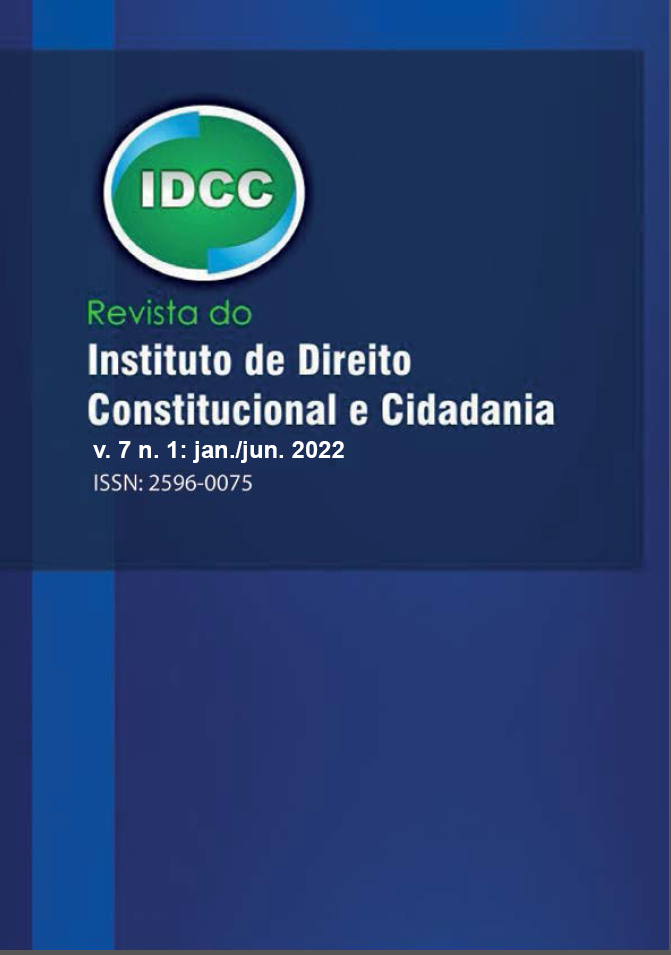Constitution and criminal proceedings
the accusatory system and the interdependence of the principles of due process of law, the contradictory and the broad defense
DOI:
https://doi.org/10.48159/revistadoidcc.v7n1.e058Keywords:
Federal Constitution, Procedural Systems, Criminal Constitutional PrinciplesAbstract
In this article, through the bibliographic and descriptive method, with consultations in works related to the theme, we aim to present reflections on the interconnection between the accusatory criminal system and the constitutional principles of due process, contradictory and broad defense. Procedural systems and criminal procedural principles with emphasis on the Federal Constitution guarantee the Democratic State of Rights in which the subject accused of committing a criminal offense has the right to be judged with constitutional guarantees that validate the application of the penalty and the entire process. The validity of an accusatory criminal system without remnants of the inquisitory, as it seems appropriate to us due to the Democratic and Social State of Law, of the Constitutional State, encounters resistance by a significant portion of the judiciary, even in the preview of the provision in the constitutional text and in the infraconstitutional of norms and principles related to the right of defense, due process and guarantees of the execution of the sentence, also indispensable to the perfect protection of individual rights (Art. 5, LIII to LXVIII and XLVIII to L) and, above all, the impartiality of the magistrate and the separation of functions: prosecution, defence and judgment.
References
ALMEIDA, Joaquim Canuto Mendes de. Princípios fundamentais do processo penal. São Paulo: Ed. RT, 1973.
ARMENTA DEU, Teresa. Lecciones de derecho procesal penal. 6. ed. Barcelona: Marcial Pons, 2012.
ARMENTA DEU. Teresa. A prova ilícita: um estudo comparado. Tradução Nereu Jose Giacomolli. São Paulo: Marcial Pons, 2014.
BINDER, Alberto B. El Incumplimiento de las Formas Procesales. Buenos Aires, Ad-Hoc, 2000.
BRASILEIRO, Renato. Manual de processo penal: volume único. 8. ed. rev., ampl. e atual. Salvador: JusPodivm, 2020.
DEZEM, Guilherme Madeira. Curso de Processo Penal. São Paulo: Thomson Reuters Brasil, 2022.
FERRAJOLI, Luigi. Direito e razão: teoria do garantismo penal. São Paulo: Editora Revista dos Tribunais, 2002.
LIMA, Renato Brasileiro de.Manual de processo penal: volume único. 8. ed. rev., ampl. e atual. – Salvador: Ed. JusPodivm, 2020.
LOPES JUNIOR, Aury. Direito Processual Penal. 17. ed. São Paulo: Saraiva. 2020.
PELLEGRINI GRINOVER, Ada; SCARANCE FERNANDES, Antônio; GOMES FILHO, Antônio Magalhães. As Nulidades no Processo Penal. 2. ed. São Paulo, Malheiros, 1992.
MORAIS DA ROSA, Alexandre; LOPES JUNIOR, Aury. A "estrutura acusatória" atacada pelo MSI - Movimento Sabotagem Inquisitória. Disponível em: ConJur - Estrutura acusatória atacada pelo Movimento Sabotagem Inquisitória. 2020.
NICOLITT, André. Manual de Processo Penal.5. ed. Revistas dos Tribunais. 2014.
NUCCI, Guilherme de Souza. Código de Processo Penal Comentado. Rio de Janeiro: Forense, 2020.
OLIVEIRA, Eugênio Pacelli de.Curso de processo penal. 22. ed. rev., atual. e ampl. São Paulo: Atlas, 2018.
PRADO, Luiz Regis. Bem jurídico-penal e constituição. 8. ed. Rio de Janeiro, Forense, 2019.
PRADO, Luiz Regis. Curso de Direito Constitucional brasileiro. Volume único. 20. ed. Rio de Janeiro, Forense, 2022.
RANGEL, Paulo. Direto Processual Penal. 2. ed. Atlas, 2016.
Downloads
Published
How to Cite
Issue
Section
License
Copyright (c) 2023 Acir de Matos Gomes, Carolina Noura de Moraes Rêgo

This work is licensed under a Creative Commons Attribution 4.0 International License.
Você tem o direito de:
Compartilhar — copiar e redistribuir o material em qualquer suporte ou formato
Adaptar — remixar, transformar, e criar a partir do material para qualquer fim, mesmo que comercial.
O licenciante não pode revogar estes direitos desde que você respeite os termos da licença.
De acordo com os termos seguintes:
Atribuição — Você deve dar o crédito apropriado, prover um link para a licença e indicar se mudanças foram feitas. Você deve fazê-lo em qualquer circunstância razoável, mas de nenhuma maneira que sugira que o licenciante apoia você ou o seu uso.
Sem restrições adicionais — Você não pode aplicar termos jurídicos ou medidas de caráter tecnológico que restrinjam legalmente outros de fazerem algo que a licença permita.

